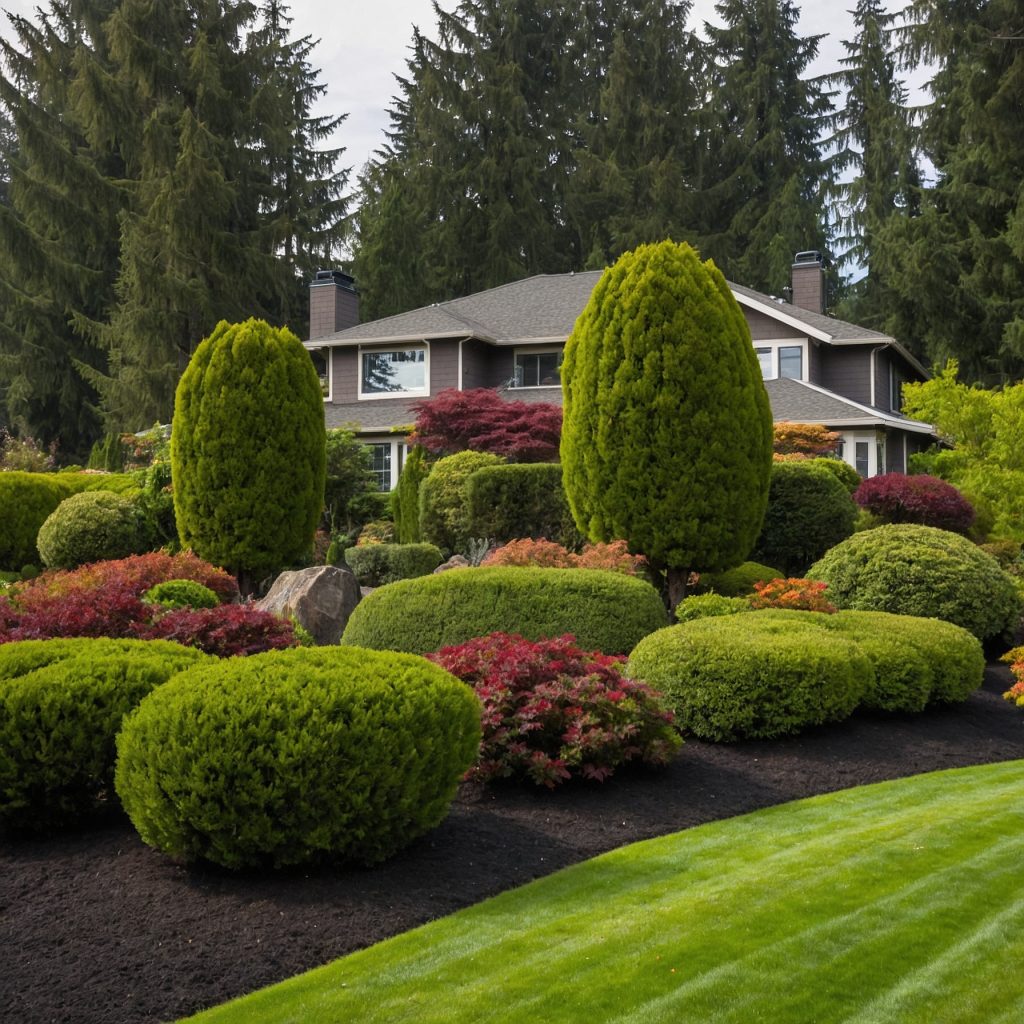The Best Hedges for Gig Harbor, WA: Beautiful and Resilient Options for Your Landscape
Hedges provide a natural, aesthetically pleasing solution for creating privacy, windbreaks, and noise barriers in residential and commercial landscapes. In Gig Harbor, Washington, with its temperate marine climate, it’s essential to choose hedge plants that can thrive in cool, damp conditions and withstand occasional dry spells. Whether you’re looking for a low maintenance, evergreen privacy screen or a flowering hedge that attracts local wildlife, here are some of the best hedge options to consider for your Gig Harbor garden.
-
Western Red Cedar (Thuja plicata)
Pros:
- Evergreen & Dense: This native species grows into a lush, dense hedge that offers privacy all year.
- Tall & FastGrowing: It can reach impressive heights, which makes it ideal for blocking out neighbors or unsightly views.
- Low Maintenance: With minimal pruning, it can be shaped to fit your preferred look.
Cons:
- Requires Space: The Western Red Cedar can get quite large, so it’s best suited for properties with ample space.
- Water Needs: While it’s drought tolerant once established, it requires regular watering during the first few years.
-
Pacific Wax Myrtle (Morella californica)
Pros:
- Adaptable & Native: Well suited to the Pacific Northwest climate, the Pacific Wax Myrtle can tolerate moist soils and salty air.
- Wildlife Friendly: Its berries attract birds, adding a natural element to your garden.
- Fast Growth & Privacy: This evergreen shrub grows relatively quickly, providing a solid hedge within a few years.
Cons:
- Regular Pruning Required: To maintain a uniform look, the Pacific Wax Myrtle needs periodic pruning.
- Susceptible to Frost: While generally hardy, it may need protection during particularly cold winters.
-
English Laurel (Prunus laurocerasus)
- Pros:
- Thick, Glossy Foliage: English Laurel has shiny, dense leaves that create an elegant, full hedge.
- FastGrowing & Hardy: It establishes quickly, making it an excellent choice for homeowners seeking a fast privacy solution.
- Evergreen: Maintains its foliage all year, which is ideal for screening and sound reduction.
Cons:
- Toxicity: Its leaves and berries are toxic to humans and pets, so it’s not the best choice if you have young children or pets.
- Invasive Potential: It can spread aggressively, so it requires attentive maintenance.
-
Boxwood (Buxus sempervirens)
Pros:
- Classic Aesthetic: Boxwood is popular for its small, dense foliage and its ability to be trimmed into various shapes and forms.
- Compact & SlowGrowing: Ideal for smaller spaces and low hedges, with minimal maintenance requirements once established.
- Resistant to Salt & Deer: Its hardiness makes it resilient in various conditions, including those near the coast.
Cons:
- Slow Initial Growth: It may take longer to form a substantial hedge.
- Susceptible to Boxwood Blight: This fungal disease can affect the appearance and health of the plant, although newer resistant varieties are now available.
-
Escallonia (Escallonia rubra)
Pros:
- Colorful Flowers: With pink, red, or white blossoms, Escallonia offers an attractive, flowering hedge option.
- Attracts Pollinators: This plant is known for attracting bees, butterflies, and other beneficial insects.
- Evergreen & Salt Tolerant: It’s well suited to Gig Harbor’s coastal conditions, remaining green year round.
Cons:
- Pruning Needs: To keep it from becoming too leggy, regular pruning is essential.
- Frost Sensitivity: Escallonia may need additional protection during severe cold spells.
-
Arborvitae (Thuja occidentalis)
Pros:
- Popular Privacy Screen: Arborvitae, particularly the ‘Emerald Green’ variety, is a popular choice for those looking to create a privacy screen.
- Low Maintenance: Once established, it requires little upkeep and is droughttolerant.
- Tall & Narrow: This makes it suitable for smaller properties or tight spaces where a tall hedge is desired.
Cons:
- Susceptible to Pests: Arborvitae can attract spider mites and aphids, so some pest control may be needed.
- Frost Sensitivity: While relatively hardy, prolonged exposure to frost may cause winter burn on foliage.
-
Nandina (Nandina domestica)
Pros:
- Year Round Interest: Also known as Heavenly Bamboo, Nandina features unique foliage that changes color with the seasons, from green to red.
- Compact Size: Perfect for lower hedges and borders, making it suitable for smaller yards or accent areas.
- Drought & Heat Tolerant: Adaptable to various conditions, making it a hardy choice for Gig Harbor.
Cons:
- Toxic to Pets: Its berries can be toxic if ingested by pets.
Can Spread Aggressively: Requires management to prevent it from becoming invasive.
Tips for Hedge Planting in Gig Harbor
- Soil Preparation: Gig Harbor’s soil is typically acidic and may need amendments, such as compost, to promote healthy root development.
- Mulching & Watering: Adding a layer of mulch around your hedges helps retain moisture, which is especially helpful during drier summer months.
- Spacing: Provide adequate spacing between plants for air circulation, which reduces disease risk and promotes healthier growth.
- Seasonal Pruning: Pruning in early spring allows new growth to fill in before the growing season, while late season pruning can encourage a more compact shape.
Conclusion
Selecting the right hedge for Gig Harbor requires balancing your aesthetic preferences with the specific needs of your environment. Whether you prefer the formal look of Boxwood, the height of Western Red Cedar, or the wildlifefriendly Wax Myrtle, there are plenty of options suited to the Pacific Northwest’s unique conditions. By choosing hedges that align with your space and maintenance preferences, you can create a beautiful, functional landscape that complements your property and stands resilient in the local climate. If you would like help planting your hedges, contact Levy’s Lawns and Landscaping at (360) 876-6567.
